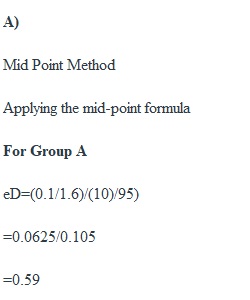


Q Use the Microeconomics Calculator link to access the Midpoint Formula program and answer the following questions. Review the A.4.2.2 Advanced Explanation- Elasticity -(Supply and Demand) and the Mid-Point Formula • Microeconomics Calculators- Question: Amazon.com, the online bookseller, wants to increase its total revenue. One strategy is to offer a 10% discount on every book it sells. Amazon.com knows that its customers can be divided into two distinct groups according to their likely responses to the discount. The accompanying table shows how the two groups respond to the discount. Amazon Sales before or after a discount Group A (Sales per week) Group B (Sales per week) Volume of sales BEFORE the 10% discount 1.55 Million 1.50 Million Volume of sales AFTER the 10% discount 1.65 Million 1.70 Million a. Using the midpoint method, calculate the price elasticities of demand for group A and group B. b. Explain how the discount will affect total revenue from each group. c. Suppose Amazon.com knows which group each customer belongs to when he logs on and can choose whether or not to offer the 10% discount. If Amazon.com wants to increase its total revenue, should discounts be offered to group A or to group B, to neither group, or to both groups? Hint: The price change is already calculated at 10%. If you are using the MidPoint Calculator, you can make up a number with a 10% change. (Price falls from $100.00 to $90.00)- The extra 50 cents is due to the midpoint calculation. Price BEFORE Discount: $100.00 Price AFTER Discount: $90.00 Answer questions a, b, and c above (summarized below) A. Calculate the midpoint Price Elasticity of Demand for groups A and B. B. Explain how the discount will affect Total Revenue of each group. C. If Amazon wants to increase Total Revenue, should the discount be applied to group A or to group B to neither or to both? PreviousNext
View Related Questions